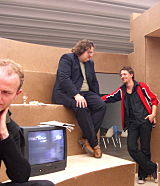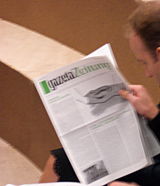SFX: Publiczność - Spontaneous Publics
[ Participants ]
Künstlergruppe Wunderteam
Wunderteam is a group of video artists from Poznań, its members being Wojciech Duda, Włodzimierz Filipek, Rafał Jakubowicz, and Maciej Kurak, who all work on their own as well. As a team they primarily realise video projects that seek to uncover institutional and social absurdities.Roman Dziadkiewicz
Born in 1972 in Opole, studied at the High Pedagogical School in Opole and at the Academy of Fine Arts in Kraków. Currenty he lives and works in Kraków. An artist, activist, head of the fundacja36,6, and occasional artist-curator.He is interested in investigating the relationships between art activity and socio-political and cultural processes. He is engaged in theme-based projects, projects in progress, actions, workshop strategies, graphic design and text projects and also collective activity on the border of art, social and educational spheres.
His interests are particularly oriented around the question of challenging and disintegrating the artwork, and conflicts and correlations between daily life and politics. Questioning the notions and roles of art in a socio-culture landscape, and the dichotomy of reality and fiction in creative art processes, Dziadkiewicz works specifically on a local level within the public sphere.
selected projects, activities or solo exhibitions:
The establishing of SAOZ (art association health centre, 1999-2002)
the Eating Holiday- social space, 2001, 02, 03
The Camel Workshop - road performance- 2002-2004
Dom (Home)- co-creating of collective place for live, art, work and play; Kraków, 2002
Money - no funny (Pieniądze szczęścia nie dają), workshop and exhibition, Manhattan gallery, Łódź, 2002
The establishing of the Fundacja36,6 (f36,6), Opole-Kraków, 2003
The Workshop of thinking (with f36,6) - Malinowe, 2003; Mumbai, 2004
SFX: Prolog Prószków- f36,6 project on social contexts of art activity (curatoring), 2004
Switzerland in the Middle East (the workshop project accompanied to the Symposium 'Geography of changes'), Kunstmuseum Bern, 2004.
SFX-publiczność, art research project, Poland / Germany, 2005
selected group exhibitions:
Pop Elite - New class of Polish art, Bunkier Sztuki, Kraków, 2001
Germinations13 - Get out! An exhibition on the subject of going away, Arsenał, Białystok, 2002
Novart.pl - Polish Young Art Festival, Kraków, 2002
A way of life / Sposób na życie, Centre of Contemporary Art 'Laznia', Gdańsk, 2002/03
simon sais 'aloha to polish art', sthm art fair, Stockholom, 2003
Dialog Loci (with f36,6), public and social space, Kostrzyn, 2004
Hamlet or (rather) Much Ado About Nothing, CCA Laznia, Gdansk, 2004
Nova Huta, Westfälischer Kunstverein, Muenster, 2004
BHP(with f36,6), Institut of Art 'Wyspa', Gdańsk, 2004
Lódź Biennale, Łódź Museum, 2004
Easter Lights, Motorenhalle, Dresden, 2004
Grants: Ministry of Culture RP (2001, 2003, 2005), Fundacja Kultury (2003), Pro Helvetia (2004), KulturStiftung des Bundes (2005)
Selected publications: 'chusteczki higieniczne' (eng. tissues, poems, 1995), catalogues: project wzgórza/hills project (99, 00, 01); Pop Elita (2001); Germinations13/Get out! (2002); The Workshop of thinking/ World Social Forum (flyer, 2004); Dialog Loci (2004); Hamlet/Re:location Shake (2004), Anxiety of influence (2004).
Agata Dutkowska
Agata Dutkowska is a sociologist and activist from Gdańsk. As a member of the Polish group Pif-Paf she works at the threshold of social theatre, city guerilla, and critically questioning visual art. Currently she is a tutor of the Robert-Bosch-Stiftung at the Sociological Institute of Düsseldorf’s Heinrich-Heine-Universität. For the project in Münster she will write an essay and, with Cicero Egli, compare sociopolitical structures and activist art events in Switzerland and Poland.Cicero Egli
Cicero Egli lives and works in Geneva. Egli is as much an artist and a curator (projects on artistic cooperation at Shedhalle Zurich 2004/2005) as he is a political activist. An expert on questions of publicness, he works at the borders between art, street culture, and activism. In addition to presenting the comprehensive video work Zones de Convergence, which casts a critical light on the 2003 G8-meeting in Geneva as well as the countermovements and discussions surrounding it, Egli seeks to stimulate, together with Agata Dutkowka, a discussion about public space in Münster. See www.forde.ch/zones.Mateusz Kula
Modulorbeat
Fabian Holst, Marc Günnewig, Jan Kampshoff – is a team of architects from Münster who are interested in the sociological and perceptual-psychological aspects of interaction with urban space and who operate at the border of design, art, and urban development. They have already worked with Łukasz Stanek on a project in Nowa Huta: see www.nowahutamanual.deFor SFX: Publicznność they will develop ideas addressing a place of disruption in urban space – a neglected square behind the Landesmuseum, facing the dilapidated buildings of the former archeological museum – and dealing with the semi-publicness of museum space like the exhibition space of the Kunstverein. The public accessibility of the square, which is owned by the responsible body of the museum, is contrasted with the exclusiveness of the public space of the Kunstverein, which can be visited free of charge.
Dr. Carina Plath
Carina Plath (*1966) studied art history, classical archaeology, and Romance languages and literature in Münster, Bologna, Munich, and Bochum. She earned her doctorate at the Ruhr-Universität Bochum with a dissertation on Maria Nordman’s work of the 1970s. From 1994 to 2001 she was an art critic for “Das Kunst-Bulletin” (Zurich) and “Neue Bildende Kunst” (Berlin) and wrote numerous articles on contemporary art for catalogues and encyclopaedias. From 1999 to 2001 she completed a degree programme in curatorial studies at Bard College’s Center for Curatorial Studies, New York. In 2000 she curated the exhibitions “image a new” at the Center and “Platino” for the Goethe-Institut New York. Since 2001 she has been director of the Westfälischer Kunstverein Münster. The exhibitions she curated there include “formal social” (2002), “Prisoners” – a project by Paweł Althamer (2002), “Wilhelm Sasnal” (2003), “STREIK” (2003), “Valérie Favre” (2004), “Matthew Buckingham” (2005), and „T,O,U,C,H,I,N,G – Wahrnehmung und Film” (2005).Rekolonisation
Rekolonisation, ein wechselndes Team um Monika Gintersdorfer und Jochen Dehn, ist eine Gruppe von Interventions-/Performance- und Videokünstlern aus Hamburg, die hauptsächlich im öffentlichen Raum arbeiten. Mit anarchistischem Humor, Selbstironie und Poesie rekolonisieren sie regulierte und kontrollierte Stellen in der Stadt. Für das Projekt „SFX: Publiczność – Spontane Öffentlichkeiten“ in Münster werden sie, gemeinsam mit Agata Dutkowska und angepasst an die vorhandene gesellschaftliche, politische und urbane Landschaft, ein Projekt im Bereich Performance- und Videokunst erarbeiten.Kai Schiemenz
Das künstlerische Schaffen von Kai Schiemenz, der in Berlin lebt und arbeitet, findet zwischen Zeichnung, Computergrafik, Modellbau, Architektur und Installation statt. Stets darum bemüht, die Grenzen von High- und Low-Culture zu verwischen, stellt Schiemenz Verknüpfungen zu aktuellen Fragestellungen und Ereignissen der Jugendkultur her. Für das Projekt „SFX: Publiczność – Spontane Öffentlichkeiten“ in Münster wird er zu Beginn der Ausstellung eine begehbare und benutzbare Skulptur in Anlehnung an die Form einer Arena errichten, die als Diskussions- und Interaktionsraum für Debatten und Präsentationen dienen wird.Łukasz Stanek
Geboren 1976 in Krakau; Diplom in Architektur und Philosophie (Krakau, Weimar, Münster); Zusammenarbeit mit Architekturbüros in den Niederlanden (Studio Sitec, Zwolle) und Italien (Studio Fuksas, Rom); Organisation des Workshops „Mindmapping Nowa Huta" (zusammen mit modulorbeat und dem Atelier für Skulptur A6 der Politechnika Kraków); Teilnahme an Forschungsprojekten an der TU Krakau, ETH Zürich und TU Delft; zur Zeit arbeitet er als Architekt in Kraków und ist wissenschaftlicher Mitarbeiter am Lehrstuhl für Architekturtheorie der TU Delft; Schwerpunkt seiner Forschung ist die Theorie der Produktion des Raums von Henri Lefebvre und ihre Anwendung für die städtebauliche Analyse.Letzte Publikation:
„The production of urban space by mass media storytelling practices:
Nowa Huta as a case study“(2005): http://web.mit.edu/comm-forum/mit4/papers/stanek.pdf
Anna Szwajgier
Anna Szwajgier wurde 1979 in Krakau geboren. Ihr Studium der Musiktheorie an der Musikakademie in Krakau schloss sie 2004 ab. Erste praktische Erfahrungen sammelte sie in den Veranstaltungen der Fachrichtung Computer-Komposition im Elektroakustischen Musikstudio (unter der Leitung von Prof. Marek Chołoniewski) und des Fachbereichs Multimediale Formen im Intermedialen Labor der Akademie der schönen Künste in Krakau. Sie komponierte die Filmmusiken zu folgenden Filmen: „Żółtodzióbstwo“ (2002), „Zmienność“, „Nierozpoznane“, „Pągowska“, „Niezwyczajne“, „Karpowicz“, „Sensacje barwne“ (2003-2004) i „Kotlet“ (2005) sowie für die Klanginstallation „Choroba morska“ (2002).Anna Szwajgier ist Mitautorin minimalistischer Projekte, der Performance „Koncert na Wysokie Obcasy“ (Konzert auf hohen Absätzen, 2005, zusammen mit Zorka Wollny) sowie der Aktion und des Videofilms „Free Cracow Tour“ (2005, zusammen mit Wojciech Doroszuk.



